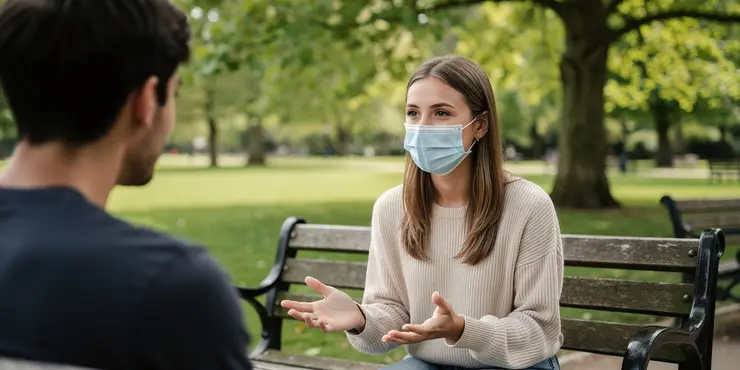
Find Help
More Items From Ergsy search
-
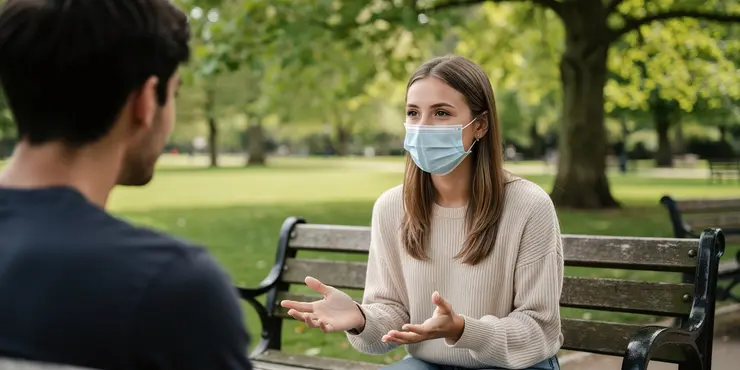
Do masks help with hay fever?
Relevance: 100%
-

Hay fever advice | NHS
Relevance: 71%
-
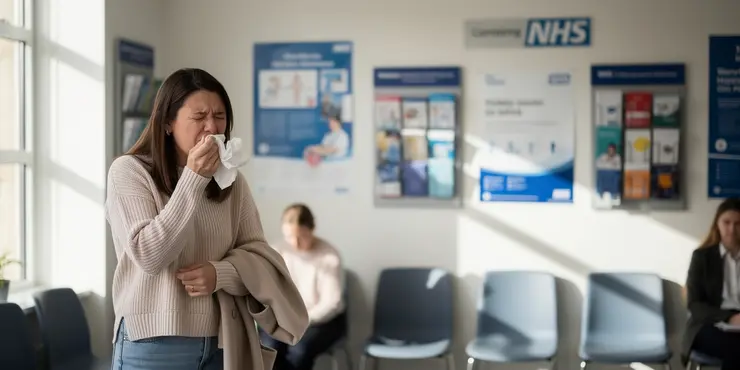
What is hay fever?
Relevance: 70%
-

Can hay fever be prevented?
Relevance: 70%
-

What are the common symptoms of hay fever?
Relevance: 65%
-
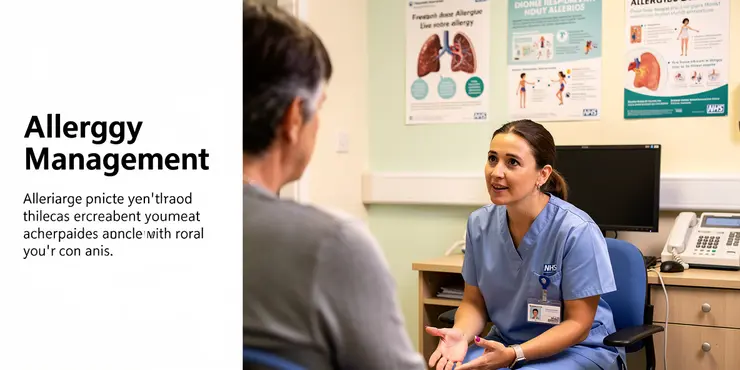
Is there a link between hay fever and asthma?
Relevance: 64%
-
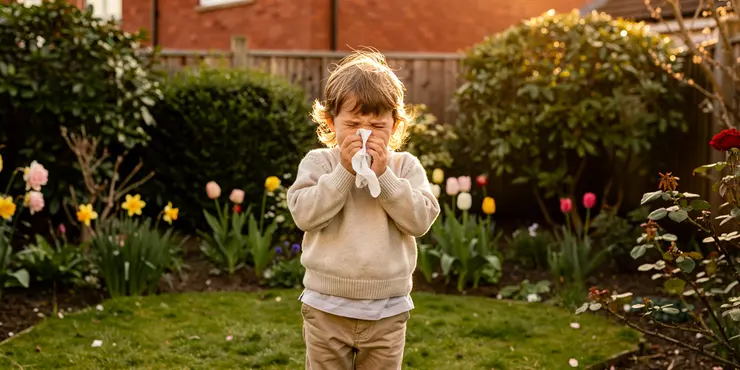
Can children develop hay fever?
Relevance: 64%
-

Can hay fever occur year-round?
Relevance: 63%
-
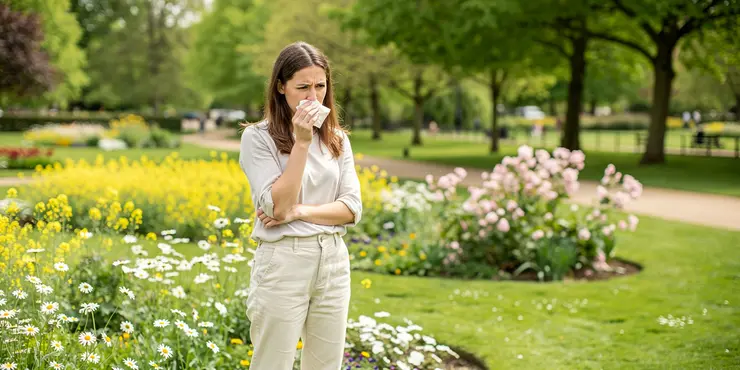
Are some people more prone to hay fever?
Relevance: 63%
-

Do pets contribute to hay fever?
Relevance: 62%
-
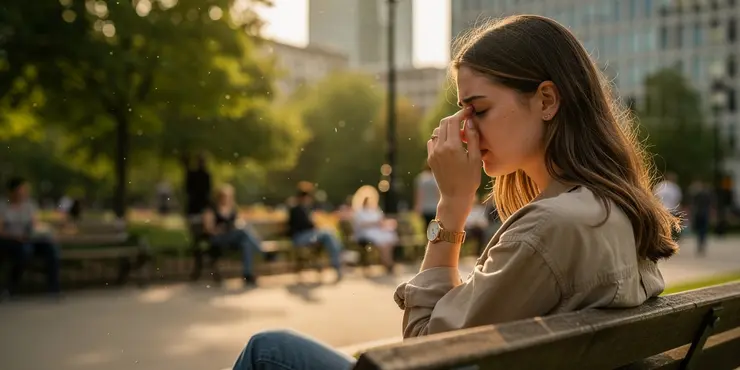
Is hay fever more common in urban areas?
Relevance: 62%
-

Can diet influence hay fever symptoms?
Relevance: 62%
-

Antihistamines how they work with hay fever
Relevance: 61%
-
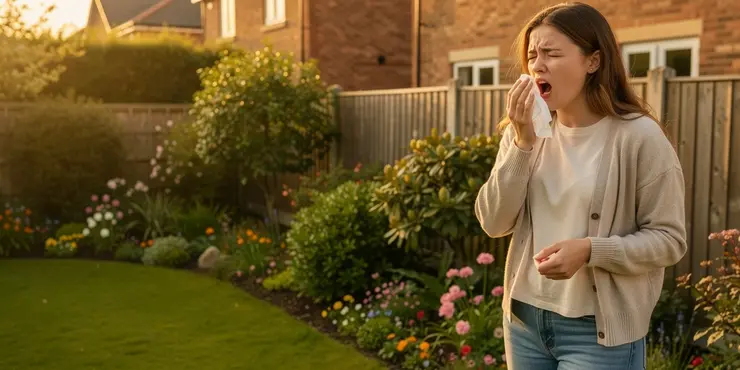
Experts Warn of Rising Hay Fever Cases as Pollen Counts Surge
Relevance: 61%
-

Can hay fever symptoms mimic other conditions?
Relevance: 61%
-
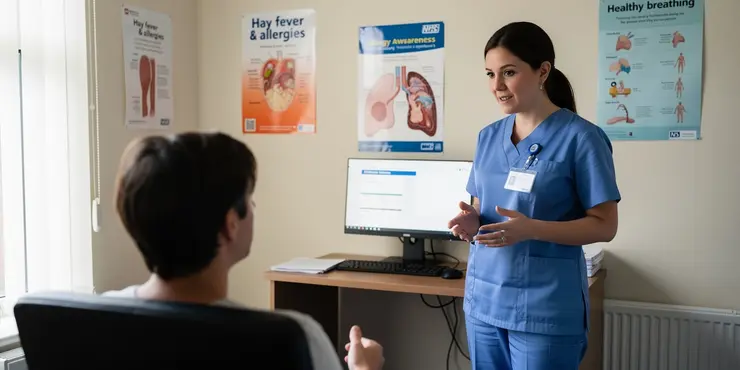
Do all plants produce pollen that causes hay fever?
Relevance: 60%
-
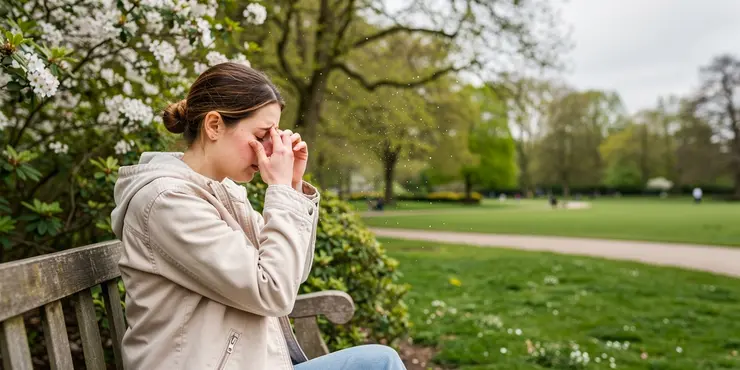
How does pollen affect people with hay fever?
Relevance: 60%
-

Why are experts warning of rising hay fever cases?
Relevance: 60%
-
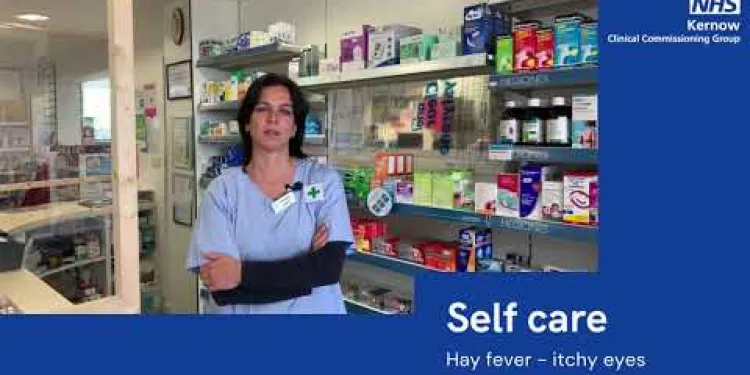
Self care - hay fever itchy eyes
Relevance: 59%
-

Can mosquito screens help reduce hay fever symptoms?
Relevance: 54%
-
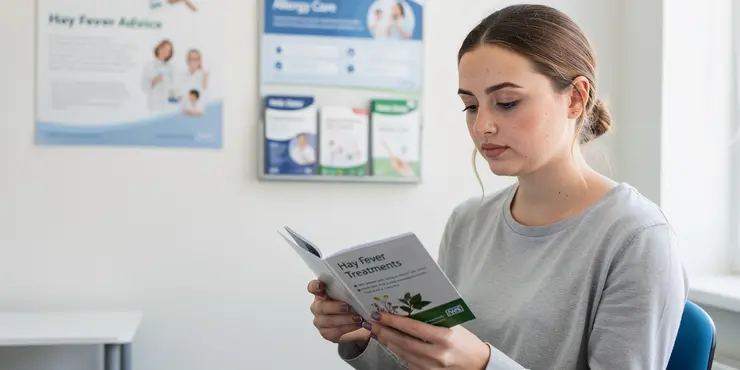
Are there any treatments for hay fever?
Relevance: 48%
-

How long does a typical hay fever season last?
Relevance: 41%
-
What is menopause masking?
Relevance: 35%
-
What is menopause masking?
Relevance: 34%
-
Why do some women use menopause masking?
Relevance: 31%
-

Do I still need to wear a mask after getting the COVID jab?
Relevance: 29%
-

Caring for a child with fever | NHS
Relevance: 28%
-

Can dengue fever be contracted in the UK?
Relevance: 27%
-

Is there a risk of yellow fever being spread by mosquitoes in the UK?
Relevance: 27%
-

How to treat glandular fever | NHS
Relevance: 27%
-
How does exercise impact menopause masking?
Relevance: 26%
-
What role does diet play in menopause masking?
Relevance: 26%
-
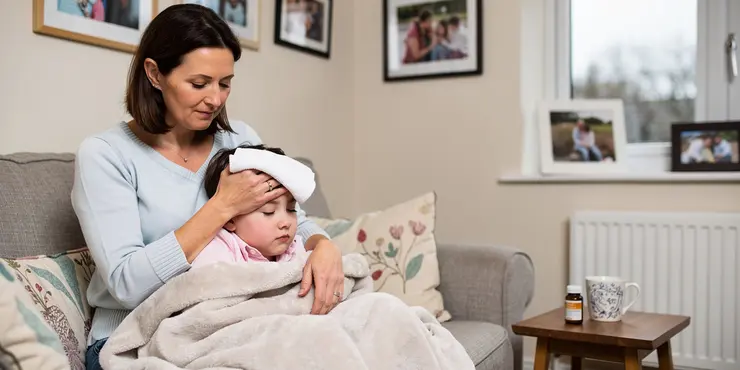
Which medication should be avoided for children with fevers?
Relevance: 26%
-
Can lifestyle changes help with menopause masking?
Relevance: 26%
-
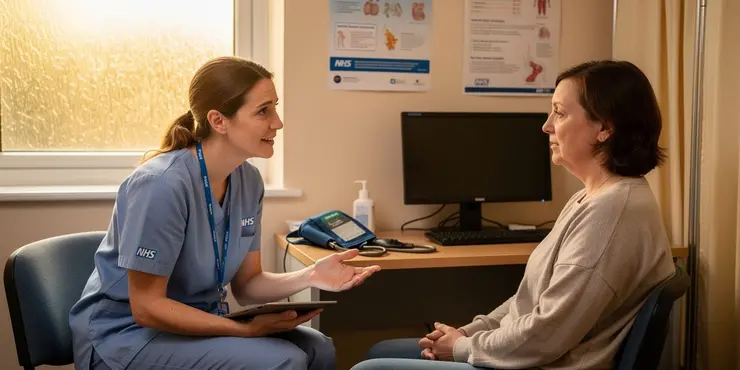
What is Dengue Fever?
Relevance: 23%
-
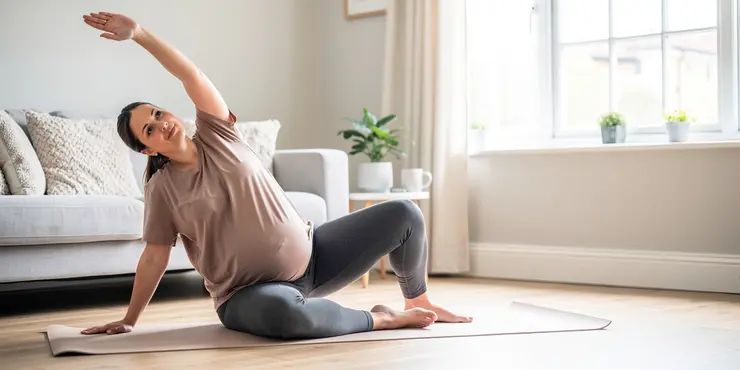
Can lifestyle changes help manage pain and fever during pregnancy?
Relevance: 23%
-
Can Dengue fever be transmitted through blood transfusions?
Relevance: 21%
-
Can stress management aid in menopause masking?
Relevance: 20%
-
What treatments are available for menopause masking?
Relevance: 20%
-
Can acupuncture help with menopause masking?
Relevance: 20%
Understanding Hay Fever
Hay fever, also known as allergic rhinitis, is a common condition that affects a significant portion of the UK population, particularly during the spring and summer months when pollen counts are high. Hay fever is caused by an allergic reaction to pollen, which can lead to symptoms such as sneezing, a runny or blocked nose, itchy eyes, and coughing. These symptoms can be quite distressing and impact the quality of life of sufferers.
The Role of Masks in Reducing Hay Fever Symptoms
Interestingly, masks have been suggested as a potential aid in mitigating the symptoms of hay fever. Wearing a mask can create a physical barrier that reduces the amount of pollen and other allergens inhaled into the respiratory system. During periods of high pollen count, wearing a mask can help filter out these particles and potentially lessen the severity of hay fever symptoms.
Types of Masks and Their Effectiveness
Not all masks offer the same level of protection against pollen. Surgical masks and cloth masks provide some degree of filtration, but they might not be as effective as masks with higher filtration capabilities. Masks such as N95 or FFP2 are designed to filter out much smaller particles and may offer better protection for hay fever sufferers. However, for day-to-day use, surgical or well-fitting cloth masks might still reduce the amount of pollen exposure significantly.
Advantages of Using Masks for Hay Fever
One of the primary advantages of using masks for hay fever is the direct reduction in the amount of pollen inhaled, which can lead to a decrease in the severity of symptoms. Masks can be a practical and simple intervention, especially if used in conjunction with other protective measures like sunglasses and avoiding high-pollen areas. Furthermore, for individuals who also have respiratory issues, masks can provide dual benefits by filtering out pollutants as well as allergens.
Considerations and Limitations
While masks can be beneficial, they are not a foolproof solution for preventing hay fever symptoms. It is important to consider that masks must be worn correctly to be effective. A poorly fitted mask may allow pollen to enter through gaps. Additionally, individuals with skin sensitivities may find prolonged mask-wearing uncomfortable. Masks should be part of a broader strategy to manage hay fever, which may include medications and lifestyle adjustments.
Conclusion
For many people in the UK, hay fever remains a seasonal challenge. Masks can serve as a useful tool in reducing exposure to pollen and alleviating symptoms, particularly during high pollen periods. Considering the practical benefits and limitations of mask-wearing, individuals with hay fever should evaluate masks as part of a comprehensive approach to managing their symptoms effectively.
Understanding Hay Fever
Hay fever, or allergic rhinitis, is when you have a reaction to pollen. This happens a lot in spring and summer in the UK. Pollen can make you sneeze, have a runny or stuffy nose, itchy eyes, and a cough. These can make you feel bad and affect your life.
The Role of Masks in Reducing Hay Fever Symptoms
Masks may help with hay fever. Wearing a mask can stop some pollen from getting into your nose and mouth. When there is a lot of pollen, wearing a mask can help you breathe in less pollen. This might make your hay fever symptoms less bothersome.
Types of Masks and Their Effectiveness
Different masks protect you differently from pollen. Cloth masks and surgical masks help a little, but not as much as special masks like N95 or FFP2. These special masks catch smaller bits and protect you better. But for daily use, a good cloth mask or surgical mask can still help reduce pollen getting in.
Advantages of Using Masks for Hay Fever
The big benefit of wearing a mask is that it helps you breathe in less pollen. This can make hay fever symptoms less strong. Masks are easy to use. It helps to also wear sunglasses and stay away from places with lots of pollen. If you have breathing problems, masks can also help keep out other bad stuff in the air.
Considerations and Limitations
Masks are helpful but not perfect for stopping hay fever. Masks must fit right to work well. If there are gaps, pollen can still get in. Some people find wearing a mask for a long time is not comfortable. Masks should be one part of dealing with hay fever. Other things like medicine and changes to what you do can also help.
Conclusion
In the UK, many people deal with hay fever every year. Masks can be a good way to help stop pollen from getting to you, especially when there is a lot of it. People with hay fever should think about using masks along with other ways to feel better.
Frequently Asked Questions
Do masks help with hay fever symptoms?
Yes, wearing a mask can help reduce exposure to pollen, which may alleviate some hay fever symptoms.
What type of mask is best for hay fever?
A mask with a good fit and a filter, such as an N95 mask, is effective in reducing pollen exposure.
Can cloth masks help with hay fever?
Cloth masks with multiple layers can offer some protection against pollen, though they may be less effective than masks with specialized filters.
How do masks protect against hay fever?
Masks act as a physical barrier, preventing pollen particles from being inhaled through the nose and mouth.
Should I wear a mask indoors for hay fever?
Wearing a mask indoors is not usually necessary unless indoor pollen levels are high or if windows are open.
Do surgical masks provide any relief from hay fever?
Surgical masks offer some level of protection against pollen, although they are not as effective as masks designed specifically for filtering fine particles.
How often should I change my mask to help with hay fever?
If your mask becomes damp or dirty, or is used for long periods outdoors, consider changing it to maintain effectiveness.
Can wearing a mask irritate my hay fever symptoms?
A poorly fitting or unclean mask might irritate symptoms, so ensure it fits well and is clean to prevent discomfort.
Do pollen masks exist specifically for hay fever?
Yes, masks designed specifically for allergy sufferers are available and can be effective in reducing pollen exposure.
Will wearing a mask prevent all hay fever symptoms?
While a mask can significantly reduce exposure to pollen, it may not completely eliminate all hay fever symptoms.
Can I wear a reusable mask to help with hay fever?
Yes, reusable masks with filters can be effective, but they should be washed regularly to maintain their effectiveness.
How do masks compare to other hay fever treatments?
Masks provide a physical barrier, offering protection comparable to allergen avoidance and complementing medical treatments.
Will wearing a mask help with other allergies besides hay fever?
Yes, masks can help reduce exposure to various airborne allergens, including dust and pet dander.
When should I wear a mask if I suffer from hay fever?
It is most beneficial to wear a mask during high pollen seasons and while outdoors in grassy or wooded areas.
Do masks help with hay fever caused by grass pollen?
Yes, masks can help reduce exposure to grass pollen, which is a common trigger for hay fever.
Are there any downsides to wearing a mask for hay fever relief?
Some people may find masks uncomfortable or may experience skin irritation, but these issues can often be addressed with proper fitting and materials.
Can children wear masks for hay fever protection?
Yes, children can wear properly fitting masks designed for their age to help reduce pollen exposure.
Is it necessary to wear a mask for hay fever at all times outdoors?
It's not necessary at all times, but wearing a mask during high pollen counts or in certain environments can be beneficial.
Can wearing a mask for hay fever also help with asthma symptoms?
Yes, masks can help by reducing exposure to allergens that might trigger asthma symptoms.
What are the best practices for wearing a mask for hay fever?
Choose a mask with good filtration, ensure a snug fit, change or wash regularly, and combine with other hay fever strategies for best results.
Can wearing a mask help with hay fever?
If you have hay fever, a mask might help you. It can stop pollen from getting into your mouth and nose. This can make you feel better.
Here are some tips to help with hay fever:
- Wear a mask when you go outside.
- Stay indoors when there is lots of pollen in the air.
- Close windows during high pollen times.
- Use eye drops or medicine from a doctor if you feel bad.
Ask someone you trust to help if you need more support. You can also use apps or talk to an expert to learn more.
Yes, wearing a mask can help keep pollen away. This can make hay fever symptoms better.
Which Mask Helps with Hay Fever?
Hay fever makes people sneeze and feel itchy. Wearing a mask can help. But, which mask is best?
A mask with a special filter can stop pollen from plants. This can help people breathe better.
Look for masks that say "allergy-friendly" or "pollen filter." These masks work best for hay fever.
It's important to wear the mask properly. Make sure it covers your nose and mouth. This will stop pollen from getting in.
A mask that fits well and has a filter, like an N95 mask, helps keep pollen away.
Do cloth masks help with hay fever?
Cloth masks can help with hay fever.
Here’s how they help:
- Masks block pollen from getting into your nose and mouth.
- Pollen is a tiny thing that causes hay fever.
- Wearing a mask can reduce sneezing and a runny nose.
If you have hay fever, try wearing a cloth mask outside.
You can also:
- Use tissues to cover your nose.
- Wash your face to remove pollen.
Cloth masks with more than one layer can help keep pollen away. But masks with special filters work better.
How do masks help with hay fever?
Masks can keep pollen out of your nose and mouth.
Pollen is a powder from plants that causes hay fever.
Try wearing a mask when you go outside. It might help you breathe better.
Masks help block pollen. They stop pollen from going into your nose and mouth.
Should I wear a mask inside for hay fever?
Hay fever makes you sneeze and your eyes itchy. It happens when there's pollen in the air.
Wearing a mask can help. It stops pollen from getting in your nose and mouth. Try it when you are inside, like in a store or a friend's house.
Other things that can help:
- Keep windows closed to stop pollen coming inside.
- Wash your face to remove pollen.
- Use special hay fever medicine.
Ask an adult if you need help. They can help you find the right mask or medicine.
You do not need to wear a mask inside most of the time. But, if there is a lot of pollen inside or if the windows are open, wearing a mask might help.
Do masks help with hay fever?
Can wearing a mask help you when you have hay fever?
Hay fever is also called allergies. It can make you sneeze, itch, and have a runny nose.
A mask can stop you from breathing in pollen. Pollen makes allergies worse.
If you have hay fever, wearing a mask might help you feel better.
To help with reading, you can use word tools that read text out loud or highlight words for you.
Surgical masks can help protect you from pollen, but they are not the best choice. There are special masks that work better to keep out tiny things like pollen.
How often should I change my mask to help with hay fever?
Change your mask every day.
A clean mask helps you breathe better.
Try these tips:
- Use tissues to blow your nose.
- Wash your hands often.
- Try to stay indoors when pollen is high.
If your mask gets wet, dirty, or you wear it outside for a long time, think about using a new one to keep it working well.
Can wearing a mask affect my hay fever?
Sometimes, wearing a mask can make hay fever worse.
Masks might make your nose feel itchy or stuffy.
If this happens, talk to someone who can help, like a doctor.
Remember, masks can also help by keeping pollen away.
If you need help, try using tissues or nasal spray.
A mask that doesn't fit right or is dirty can make you feel itchy or uncomfortable. Make sure your mask fits well and is clean to keep you comfy.
Are there special masks for hay fever?
Yes, there are special masks for people with allergies. They can help keep pollen away.
Can wearing a mask stop all hay fever symptoms?
Wearing a mask can help with hay fever, but it might not stop all symptoms. You might still sneeze or have itchy eyes.
Try these tools to help:
- Wear sunglasses to keep pollen out of your eyes.
- Stay indoors when the pollen count is high.
- Use tissues and wash your hands often.
Wearing a mask can help you breathe in less pollen. This means you might not sneeze or itch as much.
But wearing a mask might not stop all hay fever symptoms.
Try to stay indoors when pollen is high. You can also use nasal sprays or special eye drops to help.
Can I wear a mask to help with hay fever?
Yes, you can wear a mask to help with hay fever.
A mask can stop pollen from getting in your nose and mouth. This can help with sneezing and runny nose.
Use a soft, comfy mask.
Wash the mask after using it.
Try to stay indoors when pollen is high.
Use eye drops or other hay fever medicines if you need to.
Yes, you can use masks with filters again and again. They work well if you clean them often.
How do masks help with hay fever, compared to other treatments?
Masks can help with hay fever. They stop pollen from getting into your nose and mouth. Pollen makes people with hay fever feel bad.
There are other ways to treat hay fever:
- Medicines: You can take pills or use sprays that help stop the sneezing and itching.
- Eye drops: These can help if your eyes are itchy and watery.
- Home tips: Stay inside when there is a lot of pollen outside. Keep windows closed.
Using a mask is one way to help, but it’s good to use other treatments too.
Ask a grown-up or a doctor for help if you are not sure what to do.
Masks help keep you safe. They act like a shield. This is like staying away from things you are allergic to. Masks can also work with medicine to help even more.
Can wearing a mask help with other allergies and not just hay fever?
When you wear a mask, it can help protect you from things in the air. This might help with allergies, not just hay fever. Here are some ways it can help:
- A mask can stop dust from getting into your nose and mouth.
- It can block pollen, which is tiny bits from plants that can make you sneeze.
- Masks can also keep out smoke or strong smells that make it hard to breathe.
If you have allergies, wearing a mask could be a good idea. You might also try these things:
- Use a special pillow cover to keep dust from your pillow.
- Wash your hands and face to get rid of pollen.
- Stay inside when it's windy outside.
Masks can help stop some things from getting into the air you breathe. Like dust and fur from animals. This can help you if you sneeze or feel itchy when you are around them.
When should I wear a mask if I have hay fever?
If you have hay fever, wearing a mask can help you feel better.
Here’s when to wear a mask:
- Wear a mask when you go outside on windy days.
- Wear a mask when there are lots of plants and flowers around.
- Wear a mask when pollen levels are high. You can check the weather report for pollen levels.
A mask stops pollen from getting into your nose and mouth. It can help keep sneezes and itchy eyes away.
Use tissues, sunglasses, and eye drops to help with hay fever too.
It is best to wear a mask when there is a lot of pollen in the air and when you are outside in grassy or wooded places.
Can masks help with hay fever from grass pollen?
Yes, masks can help keep grass pollen away. Grass pollen often makes hay fever worse.
Can wearing a mask for hay fever cause problems?
Some people might feel that masks are not comfy. Masks can also make your skin itchy. But you can fix these problems by using the right size and materials.
Can kids wear masks to help with hay fever?
Yes, kids can wear masks that fit them well to help keep pollen away. Make sure the mask is the right size for them.
Do I need to wear a mask outside all the time if I have hay fever?
You don't always have to wear a mask. But it can help when there is a lot of pollen in the air or in some places.
Can wearing a mask for hay fever also help if you have asthma?
Wearing a mask might help people with both hay fever and asthma. A mask can keep out pollen and dust. These things can make asthma and hay fever worse.
If you have asthma, talk to a doctor about using a mask. Breathing exercises can also help. A tool like a spacer for inhalers might make breathing easier too.
Yes, wearing a mask can help you. It stops things that make asthma worse from getting into your nose and mouth.
How do you wear a mask for hay fever?
Here are some tips: - **Use a mask that fits well.** It should cover your nose and mouth. - **Put the mask on before you go outside.** This can help keep pollen out. - **Wash or change your mask often.** This keeps it clean. - **Try to stay inside on windy days.** This can stop pollen from getting on your clothes. Tools to help: - **Set reminders** to change your mask. - **Use a calendar** to track bad pollen days. These tips can help you feel better during hay fever season.Pick a mask that filters well. Make sure it fits your face nicely. Change or wash the mask often. Use other ways to help with hay fever too. This will work best.
Useful Links
This website offers general information and is not a substitute for professional advice.
Always seek guidance from qualified professionals.
If you have any medical concerns or need urgent help, contact a healthcare professional or emergency services immediately.
Some of this content was generated with AI assistance. We’ve done our best to keep it accurate, helpful, and human-friendly.
- Ergsy carfully checks the information in the videos we provide here.
- Videos shown by Youtube after a video has completed, have NOT been reviewed by ERGSY.
- To view, click the arrow in centre of video.
- Most of the videos you find here will have subtitles and/or closed captions available.
- You may need to turn these on, and choose your preferred language.
- Go to the video you'd like to watch.
- If closed captions (CC) are available, settings will be visible on the bottom right of the video player.
- To turn on Captions, click settings .
- To turn off Captions, click settings again.
More Items From Ergsy search
-

Do masks help with hay fever?
Relevance: 100%
-

Hay fever advice | NHS
Relevance: 71%
-

What is hay fever?
Relevance: 70%
-

Can hay fever be prevented?
Relevance: 70%
-

What are the common symptoms of hay fever?
Relevance: 65%
-

Is there a link between hay fever and asthma?
Relevance: 64%
-

Can children develop hay fever?
Relevance: 64%
-

Can hay fever occur year-round?
Relevance: 63%
-

Are some people more prone to hay fever?
Relevance: 63%
-

Do pets contribute to hay fever?
Relevance: 62%
-

Is hay fever more common in urban areas?
Relevance: 62%
-

Can diet influence hay fever symptoms?
Relevance: 62%
-

Antihistamines how they work with hay fever
Relevance: 61%
-

Experts Warn of Rising Hay Fever Cases as Pollen Counts Surge
Relevance: 61%
-

Can hay fever symptoms mimic other conditions?
Relevance: 61%
-

Do all plants produce pollen that causes hay fever?
Relevance: 60%
-

How does pollen affect people with hay fever?
Relevance: 60%
-

Why are experts warning of rising hay fever cases?
Relevance: 60%
-

Self care - hay fever itchy eyes
Relevance: 59%
-

Can mosquito screens help reduce hay fever symptoms?
Relevance: 54%
-

Are there any treatments for hay fever?
Relevance: 48%
-

How long does a typical hay fever season last?
Relevance: 41%
-
What is menopause masking?
Relevance: 35%
-
What is menopause masking?
Relevance: 34%
-
Why do some women use menopause masking?
Relevance: 31%
-

Do I still need to wear a mask after getting the COVID jab?
Relevance: 29%
-

Caring for a child with fever | NHS
Relevance: 28%
-

Can dengue fever be contracted in the UK?
Relevance: 27%
-

Is there a risk of yellow fever being spread by mosquitoes in the UK?
Relevance: 27%
-

How to treat glandular fever | NHS
Relevance: 27%
-
How does exercise impact menopause masking?
Relevance: 26%
-
What role does diet play in menopause masking?
Relevance: 26%
-

Which medication should be avoided for children with fevers?
Relevance: 26%
-
Can lifestyle changes help with menopause masking?
Relevance: 26%
-

What is Dengue Fever?
Relevance: 23%
-

Can lifestyle changes help manage pain and fever during pregnancy?
Relevance: 23%
-
Can Dengue fever be transmitted through blood transfusions?
Relevance: 21%
-
Can stress management aid in menopause masking?
Relevance: 20%
-
What treatments are available for menopause masking?
Relevance: 20%
-
Can acupuncture help with menopause masking?
Relevance: 20%


